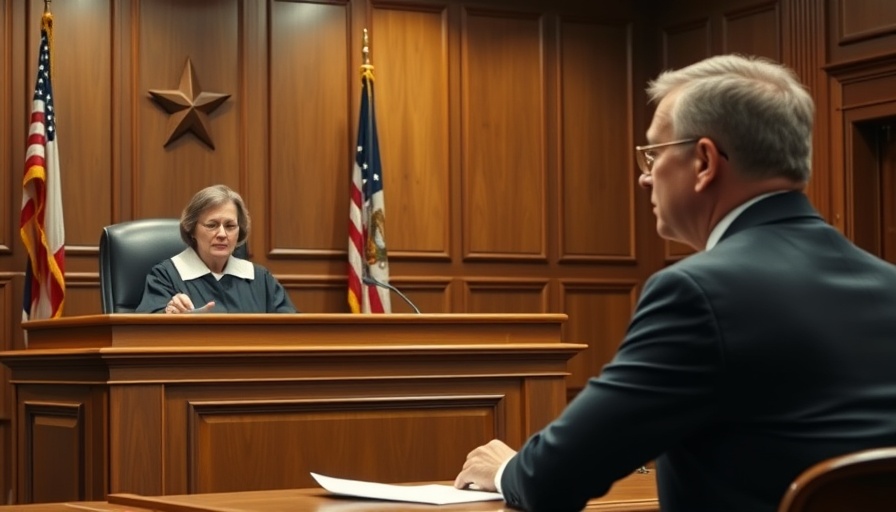
A Second Chance: A Marine’s Transformation Through the Veterans Treatment Court
In the heart of Texas, Bexar County's Felony Veterans Treatment Court stands as a beacon of hope for veterans grappling with the aftermath of military service. Among these brave souls is Travis Westbrook, a former U.S. Marine whose journey from battlefields to the courtroom offers a compelling narrative of redemption and resilience.
Navigating the Aftermath of Combat: Challenges Faced
Travis Westbrook's story begins in 2007 when he joined the Marine Corps motivated by a familial loss—the death of his brother in Iraq. This profound loss fueled a passion for service but buried deep within were unresolved traumas that would haunt him post-deployment. The transition from military to civilian life is challenging; veterans often find themselves trapped in a cycle of survival, devoid of purpose. Westbrook articulated this struggle poignantly when he noted, "You go from being willing to die for your country to asking, ‘What do I do now?’" Such reflections are common among veterans, many of whom report feelings of isolation and loss of identity after returning from overseas.
Understanding the Felony Veterans Treatment Court
The Felony Veterans Treatment Court in Bexar County, operational since 2017, is tailored to support veterans who are faced with criminal charges due to substance abuse and mental health issues linked to their military experiences. Through structured rehabilitation involving counseling, peer support, and accountability, participants are given a chance to restore their lives and overcome the legal repercussions of their struggles. Westbrook describes the program as a reset in life; a thread of accountability woven into a supportive community.
“You’re facing jail time at the start; it really makes you realize how much you’ve been half-stepping through life,” he shared. By engaging fully with the court's requirements, veterans like Westbrook discover a sense of purpose once again.
Redemption and Community Support: Essential Elements
As part of the treatment court, participants must stay sober and attend regular counseling, creating a network of support and accountability that is both motivating and transformative. As Westbrook highlights, “You can’t cheat this program; it will get you sober. Guaranteed.” This strong sense of community is vital, especially for veterans who often feel isolated after their service.
In the reshaping of his life, Westbrook found a new anchor: faith. Using his experiences, he expresses a desire to inspire hope in fellow veterans. “I hope I come across another veteran who’s struggling, and they believe me,” he stated. His mission is rooted not only in personal recovery but in a collective push towards healing for veterans everywhere.
Community Awareness: Why This Matters
The importance of understanding and supporting specialized rehabilitation programs like Bexar County’s Felony Veterans Treatment Court cannot be overstated. They offer structured environments for healing that may prevent future legal troubles and foster reintegration into society. For many veterans, this court not only serves as a judicial remedy but as a pathway towards reclaiming lost identities and reinvigorating purpose.
Every success story within this system shines a light on the struggles many veterans face upon returning home and underscores the necessity for community support systems tailored specifically for this demographic. By acknowledging the unique challenges veterans confront, society can better facilitate their integration through resources, education, and empathy.
Conclusion: Taking Action for Change
Travis Westbrook’s transformative experience exemplifies a journey of resilience and redemption, fueled by a commitment to personal growth. As he redefines his purpose, he also encourages the community to engage with local veterans in meaningful ways, helping them navigate their own journeys. The memories of war fostered mental health challenges and vulnerabilities that, if left unaddressed, can lead to devastating choices. Expanding support initiatives for veterans can unlock pathways to successful rehabilitation.
With the ongoing support from communities like those in San Antonio, we can help ensure that fewer veterans experience incarceration as a consequence of untreated trauma or substance abuse. It’s time to lend our voices and actions to uplift those who have given so much of themselves for our country.
To support initiatives like the Felony Veterans Treatment Court, consider volunteering, donating, or simply spreading the word. So many veterans, like Travis Westbrook, are hoping to reclaim their lives.
 Add Element
Add Element  Add Row
Add Row 



 Add Row
Add Row  Add
Add 


Write A Comment